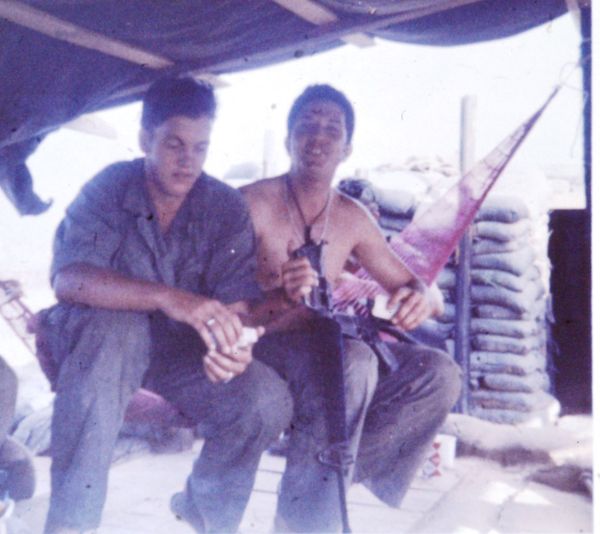It’s raining tonight. Though I don’t have a tin roof, I hear it clearly. When I lived in rural Africa, my house had a tin roof, and at night, the sound of rain made sleep easy. You probably know the feeling.
Above is a photo of my friend, Johnny Dalton, who was from the mountains of east Tennessee and who carried the M-60 machine gun in our platoon in Vietnam. If you see my blog on Dec. 8, 2020, you’ll see my story about him. He was a friend.
In the picture, we’re back from operations in the field and are in the shade of a tent in our base camp. I’m cleaning my M-16 as I always did after being in the field. I could clean it blindfolded and had to do just that in advanced infantry training.
Dalton died recently but years ago, our company and platoon had a reunion, and Jethro, as we called him, and I were talking. For some reason, I was telling about how much I enjoyed the sound of rain on a tin roof and that I now missed it. He loved it too.
“No,” I responded.
“I don’t have a tin roof either, so here’s whatcha do. You get you a big ole aluminum roastin’ pan, punch holes in it to let water through, and nail it to your bedroom’s windowsill. As the rain falls, raindrops’ll hit it, and it’ll sound just like a tin roof. Mannn, it’ll rock you to sleep.”
For some reason, my wife won’t let me nail a shiny aluminum pan to the windowsill of our historic house, but think about it. People ask about unit cohesion in combat. Some didn’t have it in Vietnam. We did. Wouldn’t you sacrifice for this kind of guy?
ABOUT THE AUTHOR
 George W. McDaniel, Ph.D., is President of McDaniel Consulting, LLC, a strategy firm that helps organizations use history to build bridges within itself and to its broader constituents. The company’s tag line, “Building Bridges through History,” is grounded in McDaniel’s personal beliefs and his experience in site management, preservation, education, board development, fundraising, and community outreach. Rather than using history to divide us, he strives to help organizations use history, especially local history, to enhance cross-cultural understanding and to support local museums, preservation, and education. Dr. McDaniel led volunteer efforts with Emanuel AME Church and historical organizations in Charleston to use historic preservation to enhance racial reconciliation and healing. McDaniel is also the Executive Director Emeritus of Drayton Hall, a historic site in Charleston, SC, owned by the National Trust for Historic Preservation. He retired from Drayton Hall in 2015 after 25 years of distinguished service.
George W. McDaniel, Ph.D., is President of McDaniel Consulting, LLC, a strategy firm that helps organizations use history to build bridges within itself and to its broader constituents. The company’s tag line, “Building Bridges through History,” is grounded in McDaniel’s personal beliefs and his experience in site management, preservation, education, board development, fundraising, and community outreach. Rather than using history to divide us, he strives to help organizations use history, especially local history, to enhance cross-cultural understanding and to support local museums, preservation, and education. Dr. McDaniel led volunteer efforts with Emanuel AME Church and historical organizations in Charleston to use historic preservation to enhance racial reconciliation and healing. McDaniel is also the Executive Director Emeritus of Drayton Hall, a historic site in Charleston, SC, owned by the National Trust for Historic Preservation. He retired from Drayton Hall in 2015 after 25 years of distinguished service.
A frequent writer, speaker, and facilitator about such issues, he can be reached at gmcdaniel4444@gmail.com or through his website at www.mcdanielconsulting.net.
All images courtesy of the author unless otherwise noted.

 McDaniel Consulting LLC is a strategy firm that helps organizations use history to build bridges within itself and its broader constituents.
McDaniel Consulting LLC is a strategy firm that helps organizations use history to build bridges within itself and its broader constituents.